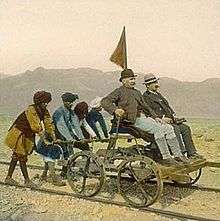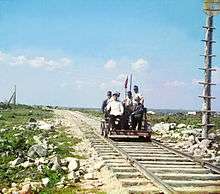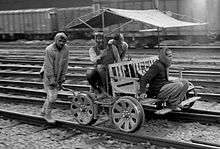Rail push trolley
A rail push trolley or simply a push-trolley is a hand-pushed trolley used to inspect the rails and other track-side railway infrastructure. It is a simple trolley, pushed by two or four persons (called trolleymen), with hand brakes to stop the trolley. When the trolley slows down, two trolleymen jump off the trolley, and push it till it picks up speed. Then they jump into the trolley again, and the cycle continues. The trolleymen take turns in pushing the trolley so that the speed is maintained and two persons do not get tired. Four persons are also required to safely lift the trolley off the rail tracks when a train approaches.



Use
Rail tracks have a tendency to develop various defects including cracks, loose packing etc., which may lead to accidents. The first rail inspections were done visually. Push trolley inspections formed a very important part of these visual inspections.
Indian Railways
Although many railways in the world have switched to other methods of inspection, it is still widely used over Indian Railways[1][2][3][4] in addition to other techniques, especially for inspecting railway track and assets like bridges which are situated between stations. The push trolley carries one or more officials inspecting the track and the railside equipment. The official carries instruments to measure and check the condition of the tracks and monitor the work being done by the trackmen, keymen, gatemen etc. who maintain, patrol, man the track and installations. The push trolley is also used by officials inspecting signalling installations in some parts of India. On routes carrying high volumes of traffic, such as the suburban section in Mumbai, push trolleys cannot be used and foot inspections are being resorted to.
Advantages
Push trolleys have a major advantage over motorised trolleys as they do not require any traffic block and the inspecting officials can carry out inspections at their leisure.
Disadvantages
The push trolleys are a potential safety hazard as they occupy track (albeit temporarily) and, if the trolley is not removed from track in time, it can collide with a train and cause an accident. Therefore, on sections having gradients or poor visibility, the push trolleys are not allowed without traffic blocks. '[5]
See also
- Draisine
- Handcar
- Maintenance of way
- Nondestructive testing
- Rail inspection
- Rail tracks
- Track checker
References
- "The track's safe". Indian Express. 2011-07-17. Retrieved 2011-10-28.
- "Five Railway employees killed in track mishap". Sahara Samay. 5 Oct 2011. Retrieved 2011-10-28.
- "Push trolley wheels suitable for digital axle counter" (PDF), 81st Meeting of the Track Standards Committee - December 2010, pp. 17–18, retrieved 2011-10-28
- "Sub: Working of Push trollies and lorries" (pdf). SOUTH EASTERN RAILWAY. 21 September 1995. Retrieved 2011-10-28.
- "PERMANENT WAY AND WORKS" (PDF). Indian Railways. Retrieved 2011-10-28.